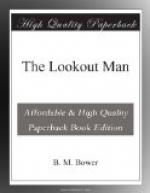Straightway he became hungry, perhaps because a porter came down the aisle announcing the interesting fact that breakfast was now being served in the diner—fourth car rear. Jack felt as though he could eat about five dollars’ worth of breakfast. He was only a month or so past twenty-two, remember, and he himself had not committed any crime save the crime of foolishness.
He slid farther down upon his spine, pulled his nice new sombrero lower on the bridge of his tanned nose, and tried to forget that back there in the diner they would give him grapefruit on ice, and after that rolled oats with thick yellow cream, and after that ham and eggs or a tenderloin steak or broiled squab on toast; and tried to remember only that the check would make five dollars look sick. He wished he knew how much the fare would be to some of those places where he meant to lose himself. With all that classy-looking paraphernalia he would not dare attempt to beat his way on a freight. He had a keen sense of relative values; dressed as he was he must keep “in the part.” He must be able to show that he had money. He sighed heavily and turned his back definitely upon a dining-car breakfast. After that he went to sleep.
At noon he was awake and too ravenous to worry so much over the possibility of being arrested for complicity in a murder. He collided violently with the porter who came down the aisle announcing luncheon. He raced back through two chair cars and a tourist sleeper, and he entered the dining car with an emphasis that kept the screen door swinging for a full half minute. He tipped the waiter who came to fill his water glass, and told him to wake up and show some speed. Any waiter will wake up for half a dollar, these hard times. This one stood looking down over Jack’s shoulder while he wrote, so that he was back with the boullion before Jack had reached the bottom of the order blank—which is the reason why you have not read anything about a certain young man dying of starvation while seated at table number five in a diner, somewhere in the neighborhood of Paso Robles.
When he returned to his place in the chair car he knew he must try to find out what isolated fishing country was closest. So he fraternized with the “peanut butcher,” if you know who he is: the fellow who is put on trains to pester passengers to death with all sorts of readable and eatable indigestibles.
He bought two packages of gum and thereby won favor. Then, nonchalantly picking up his wading boots and placing them in a different position, he casually asked the boy how the fishing was, up this way. The peanut butcher balanced his tray of chewing gum and candy on the arm of a vacant chair beside Jack, and observed tentatively that it was fine, and that Jack must be going fishing. Jack confessed that such was his intention, and the vender of things-you-never-want made a shrewd guess at his destination.




